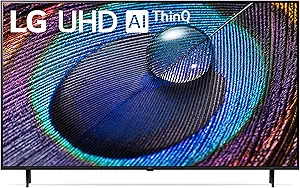In the vast landscape of television choices, LG and Philips have established themselves as prominent players, each bringing unique strengths to the table. As consumers navigate the decision-making process, it becomes crucial to understand the distinctions between these brands to make an informed choice. In this article, we'll explore the LG vs Philips TV matchup, delving into display technologies, features, and design aesthetics.
Picture Quality
Philips televisions have earned acclaim for their exceptional picture quality, notably highlighted by their Ambilight technology, which extends the screen's colors onto the surrounding wall, fostering an immersive viewing atmosphere. Additionally, Philips TVs integrate the P5 Perfect Picture Engine, optimizing sharpness, color accuracy, contrast, and motion. However, Philips lags in HDR performance compared to its counterparts, with HDR content often exhibiting inferior brightness and contrast levels. Conversely, LG televisions excel with OLED technology, delivering unparalleled picture quality characterized by deep black levels crucial for high contrast ratios, resulting in vibrant colors and seamless motion. LG's latest models further enhance the HDR experience with Dolby Vision IQ and HDR10 Pro support. Nevertheless, OLED panels are susceptible to burn-in, potentially impacting the TV's longevity. While LG generally leads in picture quality, especially in HDR performance, Philips distinguishes itself with the unique immersive experience facilitated by its Ambilight technology.
Design
Philips and LG stand out as prominent contenders in the television landscape, each showcasing distinctive design philosophies. Philips sets itself apart with its sleek and understated design language, characterized by slim bezels and a minimalist profile aimed at seamless integration into any home environment. Noteworthy among Philips' latest offerings is the Ambilight technology, elevating the viewing experience by extending on-screen colors onto the adjacent wall. Despite its elegance, Philips TVs often lean towards a more conventional design approach, lacking the innovative flair seen in competing brands. Conversely, LG leads the charge in design innovation, epitomized by its ultra-thin OLED models capable of wall-mounting for a visually striking floating effect. LG's Gallery Design models emulate the appearance of art pieces adorning walls, while the brand's pioneering rollable OLED TV showcases its commitment to pushing design boundaries. However, these groundbreaking designs typically command a premium price. In contrast to Philips' traditional aesthetic, LG televisions boast a futuristic and contemporary design ethos, making them a preferred choice among enthusiasts of cutting-edge technology.
Sound
Renowned for their commitment to sound excellence, Philips televisions elevate the audio experience through integration of Dolby Atmos technology in their premium models. This innovative technology creates a multi-dimensional soundstage, heightening immersion during viewing sessions. Additionally, select Philips TVs incorporate DTS Play-Fi technology, enabling seamless wireless transmission of lossless audio. However, disparities in sound performance exist among different Philips models, with lower-tier variants sometimes falling short of expectations. Conversely, LG televisions feature AI Sound Pro functionality, which optimizes audio content for enhanced listening pleasure. High-end LG models, notably those within the OLED and NanoCell series, boast Dolby Atmos technology for immersive soundscapes. Moreover, certain LG TVs integrate built-in soundbars from Meridian Audio, renowned for their high-fidelity audio reproduction. Nonetheless, akin to Philips, sound quality may vary across LG's model range, with lower-end options potentially lacking the audio prowess of their premium counterparts. While both brands showcase impressive audio technologies, the overall sound experience is contingent upon the specific model chosen.
Quality and Performance
Philips televisions have earned acclaim for their exemplary display quality and performance. The brand's latest iterations integrate the P5 Perfect Picture Engine, enriching sharpness, color fidelity, contrast, and motion handling. Additionally, Philips sets itself apart with Ambilight technology, casting a luminous aura from the TV screen onto the adjacent wall, elevating the visual immersion. Nonetheless, some users have voiced concerns regarding the smart TV interface, citing its lack of intuitive functionality compared to competitors. Conversely, LG televisions are synonymous with superior performance and craftsmanship. Equipped with the ?9 Gen 3 AI Processor 4K, LG's latest releases employ advanced deep-learning algorithms to upscale lower resolution content, heightening picture clarity. Moreover, LG's mastery of OLED technology ensures impeccable black levels and unparalleled contrast ratios, resulting in captivating visual realism. Nevertheless, LG's premium offerings often entail a higher price point, potentially limiting accessibility for budget-conscious consumers. While both brands deliver top-tier televisions, LG's cutting-edge technologies and renowned OLED displays may confer a competitive advantage in terms of performance and quality.
Smart TV and Connectivity
Both Philips and LG stand as prominent figures in the television market, each boasting smart TV functionalities and diverse connectivity options. Philips sets itself apart with its signature Ambilight technology, which bathes the viewing area in an immersive glow, emanating from three sides of the screen and dynamically adjusting to match the on-screen content—a feature absent in LG TVs. Despite this, Philips users have reported sluggishness in the smart interface, detracting from the overall user experience. Conversely, LG adopts the acclaimed WebOS platform, lauded for its user-friendly interface and seamless navigation between apps and services. Additionally, LG's incorporation of ThinQ AI technology enables convenient voice control capabilities, giving it an edge over Philips in this aspect. While Philips offers standard connectivity features like Wi-Fi and Ethernet, LG expands the horizons with HDMI and USB ports, catering to diverse device connections. Nevertheless, LG's premium pricing may pose a consideration for budget-conscious consumers compared to Philips.
Brand Reputation
Philips and LG stand out as notable contenders in the television market, each carrying a distinct legacy. Philips has built its reputation on innovation and a steadfast commitment to top-tier products. Their contributions to the industry, notably the pioneering Ambilight technology, have redefined the viewing experience by casting dynamic lights onto the surrounding walls, synchronizing with on-screen content. However, Philips TVs may not be as ubiquitous as their competitors, and their Saphi smart TV platform is often criticized for its lack of user-friendliness and comprehensiveness. Conversely, LG has earned acclaim for its dedication to delivering superior picture quality and cutting-edge features. A frontrunner in OLED technology, LG sets the bar with unparalleled color accuracy and contrast ratios. Their WebOS smart TV platform garners accolades for its seamless interface and vast array of apps. Despite these accolades, LG TVs typically command a higher price point, and their LCD models may fall short in dimly lit environments compared to OLED counterparts. In comparison to Philips, LG enjoys wider availability and offers a broader spectrum of models catering to diverse needs and budgets.
Brightness
Philips is renowned for its Ambilight feature, which casts the colors of the screen onto the surrounding walls, enriching the visual experience. This technology, complemented by HDR Plus, expands the spectrum of brightness and contrast, rendering images with heightened vibrancy and authenticity. However, Philips TVs, while boasting decent brightness, may not be optimal for exceedingly bright environments due to increased light reflection and potential glare. Conversely, LG televisions, particularly those leveraging OLED and NanoCell innovations, excel in brightness performance. OLED technology empowers LG TVs to attain impeccable blacks and an infinite contrast ratio, resulting in sharper and brighter visuals. Moreover, LG's NanoCell technology enhances brightness by absorbing extraneous light wavelengths, minimizing reflections, thus rendering LG TVs more adept for brightly lit spaces. Nevertheless, it's important to acknowledge that while LG TVs deliver superior brightness, they often come at a premium compared to Philips counterparts. In contrast to other brands, both Philips and LG offer competitive brightness capabilities, with LG's cutting-edge technologies affording it a distinct advantage in this regard.
Smart Features
Both Philips and LG televisions boast a plethora of smart functionalities, positioning them competitively within the contemporary TV landscape. Philips TVs operate on the Android TV platform, granting users access to an extensive array of applications from the Google Play Store, encompassing popular streaming services like Netflix, Amazon Prime, and YouTube. Additionally, the Ambilight feature in Philips TVs enriches the viewing milieu by extending on-screen hues onto the walls behind the television. However, users have cited challenges with Philips TVs' interface intuitiveness compared to rival brands, and the Android TV platform may lag in receiving timely updates. Conversely, LG televisions employ the WebOS platform, celebrated for its user-friendly interface and broad app selection. WebOS further distinguishes itself with ThinQ AI functionality, enabling seamless TV and device control through voice commands. Furthermore, LG TVs accommodate Apple users with support for Apple AirPlay 2 and HomeKit integration. Nevertheless, LG's premium pricing contrasts with Philips offerings, despite potential drawbacks such as occasional software glitches and inconsistent ThinQ AI voice recognition.
Remote Control
Philips and LG televisions each incorporate sophisticated remote control functionalities to elevate the user experience. Philips' TV remote stands out for its straightforward design and user-friendly layout. Recent models feature a QWERTY keyboard on the rear, facilitating convenient internet browsing. Additionally, select Philips remotes integrate a built-in microphone for voice commands, enabling users to effortlessly manage channels, volume, and applications without manual inputs. However, some users have noted occasional sluggishness in Philips remote responsiveness. Conversely, LG's Magic Remote earns acclaim for its pioneering design and advanced capabilities. Resembling a computer mouse, it empowers users with a cursor for seamless on-screen navigation and selection. Furthermore, the Magic Remote embraces voice recognition technology, leveraging Google Assistant or Alexa for TV control and smart home device management. Nonetheless, users may require an adjustment period to acclimate to this novel control method. While both Philips and LG offer distinctive remote control features, LG demonstrates greater innovation by incorporating cutting-edge technologies.
LG Nano76 vs Philips PUS8807 Smart TV
Conclusion
Choosing between LG and Philips TVs involves considering individual preferences, budget constraints, and the features that matter most to you. LG's OLED displays offer an unparalleled visual experience, while Philips aims to provide competitive picture quality and unique features at more accessible price points. Evaluate factors such as display technology, resolution, smart TV features, and design aesthetics to find the TV that aligns with your needs and preferences.




















